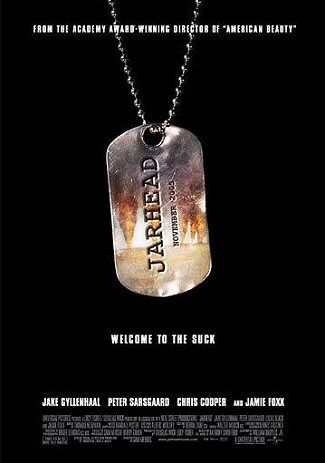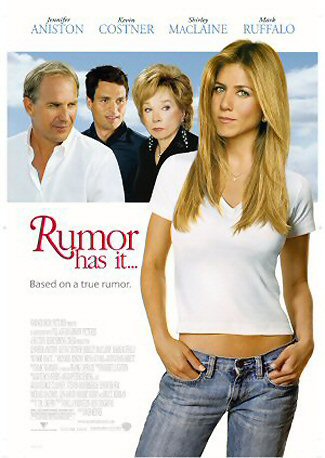Love Come Lately
I’ve already mentioned I was pretty much blown away by Fernando Meirelles’ The Constant Gardener (Focus Features, 8.26). What’s hitting me now about this film has more to do with irony.
Gardener is essentially a political murder-mystery that achieves a very unique payoff because it also invests in an unusual kind of love story (i.e., a widower falling more profoundly in love with his wife after she’s dead than when she was alive).

The Constant Gardener director Fernando Meirelles, during interview in Regency hotel lounge — Tuesday, 8.9, 4:25 pm.
In so doing Gardener delivers what seems like precisely the sort of freshness that audiences, fed up with the usual usual, are said to be especially hungry for these days. I’ve seen it twice now and if anything it gained from a second viewing.
Mostly set in Kenya, it’s about the brutal murder of a mouthy British activist named Tessa Quayle (Rachel Weisz), who was also the wife of a milquetoasty British diplomat named Justin Quayle (Ralph Fiennes).
Prior to her death, Quayle has lived within a cloistered and genteel world that doesn’t permit any rude socio political intrusions. But once he starts looking into her killing, he discovers who she really was and gradually finds himself trying to follow her ethical lead as his investigations lead into some complex and dangerous mucky-muck involving the pharmaceutical industry (i.e., Big Pharma).
< ?php include ('/home/hollyw9/public_html/wired'); ?>
The irony is that this visual tour de force (beautifully shot by City of God‘s Cesar Charlone and edited by Claire Simpson) may be too thoughtful and complex and emotionally subtle to play with a popcorn audience.
There’s also the concern we’ve all been hearing about releasing a high-toned fall movie in late August plus the old saw about the two leads, Ralph Fiennes and Rachel Weisz, not being marquee names, etc.
You might think you’ve seen this kind of thriller (i.e., man/woman is determined to find out who killed a loved one) fifty or sixty times before, but there’s such a feeling of adult complexity and discovery in this thing that memories of all those other what-really-happened? dramas are fast forgotten.
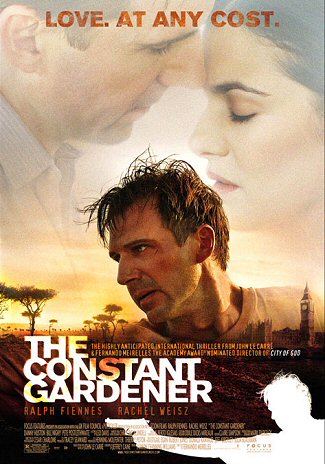
I sat down with Meirelles at Manhattan’s Regency hotel on Tuesday afternoon to mainly talk about the cinematography and the editing, which are worth the price of admission in themselves.
There’s a fine line between hyper photography and super-fast cutting being very cool and very annoying. Some of the cutting in The Bourne Supremacy was in the latter category. It seemed that it was cut faster than any big-studio action film that had come before so people would notice it was cut faster than any big-studio action film that had come before.
Simpson’s cutting of The Constant Gardener doesn’t ever feel this way and there’s not much difference between the two so I’m talking about some very slight quantifications. Good editing is like good music and it’s always hard to explain musical quality…but most of us know it when we hear it.
Meirelles and Simpson arrived at the shape and pacing of The Constant Gardener very slowly, he said. At first they told the story in a standard sequential way start to finish, which ran about three hours…but it was “boring.”
They eventually decided to hop around during the first half and start with Tessa’s death being discovered, which, of course, is exactly how the John Le Carre novel begins. They edited it for a total of six or seven months, including two months in Kenya last summer and three months in Meirelles’ native Brazil.
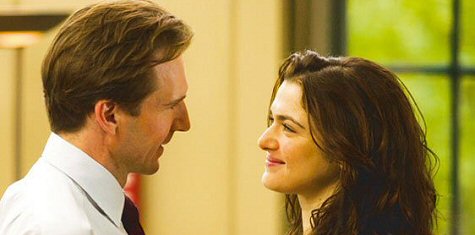
Ralph Fiennes, Rachel Weicz
Meirelles is sensing an evolving receptivity to faster and faster cutting. “People wouldn’t understand” Gardener‘s editing style, he says, if it had been released in the 1950s. He supports wholeheartedly the influence of MTV videos over the past 20 years or so, which have brought about a new visual discipline among directors.
Nonetheless, something tells me there’s a limit to this. Velocity in and of itself can be extremely bothersome without a really masterful conductor keeping time.
Meirelles’ next film will be a multi-character piece that will try to explore the effects of globalism, or the gradual eradication of local culture at the hands of corporate multinationals. Meirelles may be kidding or not, but he says the title will be Intolerance: the Sequel.
I’ve said it twice and I’ll say it a third time: The Constant Gardener is the best theatrical adaptation of a John le Carre novel since The Spy Who Came In From The Cold (1966), partly because it’s the most emotionally involving. Forget the last John le Carre adaptation, which was John Boorman’s sluggish The Tailor of Panama. Gardener is of a much higher order.
Elder-ly
John Singleton’s Four Brothers is quality crap, and I mean that respectfully.
It’s basically a John Wayne western…a likable, stupid-ass gunfight movie that nonetheless works because it turns the cliches around just enough in each scene, and because the acting and dialogue between the actors playing the bi-racial brothers (Mark Wahlberg, Tyrese Gibson, Garrett Hedlund, Andre Benjamin) is warm and spirited and funny now and then, and because the action scenes are organically slam-bang — fast and hard with a kind of ’70s verismilitude.
This would be a great movie to see at a drive-in if there were still drive-ins. It’s also the kind of film that probably plays a little bit better if you’re drinking beer.
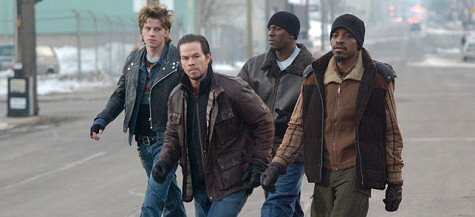
If you’re a slightly older genre buff, the action-driven plot of John Singleton’s Four Brothers will remind you of…
It’s a formula revenge thing about four Detroit guys going after the gangsta scum who were behind the shooting death of their mother. It’s all pulp but I didn’t mind it, and I was expecting to hate it because I haven’t trusted Singleton in a long time. I could feel the audience at last night’s all-media screening having a good time. It’s going to do pretty well this weekend.
David Elliot and Paul Lovett’s script seems pretty closely modeled on Henry Hathaway’s The Sons of Katie Elder (1965), which was about four rambunctious brothers avenging their father’s death and untangling a financial swindle that had victimized their mother.
Kindly but tough-talking Evelyn Mercer (Fionnula Flanagan) is fatally shot for absolutely no reason during a random grocery holdup, which means, of course, that she’s the victim of a hit. The movie starts with her four sons coming home for her funeral, and we know they’ll eventually get wise and take action.
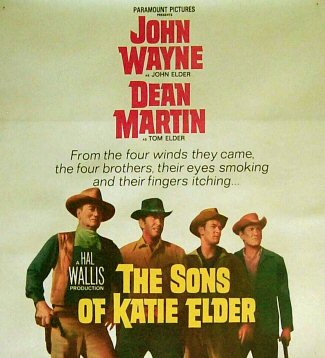
…Henry Hathaway’s moderately entertaining The Sons of Katie Elder, which co-starred John Wayne, Dean Martin, Earl Holliman and Michael Anderson, Jr. (One kink in the rope was the fact that Wayne and Anderson seemed way too far apart in age to be sons of the same mom.)
What wins you over is that Singleton takes his time getting to this point, paying attention first to character-building with good humor and easygoing acting and even some surreal stuff.
When the action stuff kicks in (the highlights are a nighttime car chase during a blizzard and a ferocious attack on the family home by the baddies with automatic weapons), he goes for balls-out vigor but in a non-martial-artsy, forget-John-Woo way that feels refreshing as shit.
As an ex-con with a hair-trigger temper, Wahlberg pretty much carries every scene he’s in. Steady backup is provided by Gibson (Baby Boy, 2 Fast 2 Furious), Benjamin (mainly known as a rapper with OutKast) and Hedlund (the kid with the asshole father in Friday Night Lights).
Also good (if under-utilized) are Hustle & Flow alumni and Singleton pals Terrence Howard and Taraji P. Henson. British actor Chiwetel Ejiofor (last in Woody Allen’s Melinda and Melinda, and before that in Stephen Frears’ Dirty Pretty Things) pretty much kills and is even amusing a couple of times as a Detroit gangster who keeps his troops in line by occasionally humiliating them a la Warren Beatty’s “crawl and bark like a dog” routine in Bugsy.
Envisioning Abe
I’ve spoken to Liam Neeson about his upcoming portrayal of Abraham Lincoln twice this week — once at Focus Features’ Constant Gardener party on Monday night and again at last night’s small-scale soiree at Michael’s for Paramount Classics’ Asylum.
And the second time I passed along a tiny piece of information about Lincoln’s speaking voice that Neeson thanked me for, and which might affect his performance on some level. Hey, it’s conceivable.
Neeson is playing our 16th President in a Lincoln biopic that Steven Spielberg will most likely begin shooting, Neeson said, sometime in March ’06. There was an earlier plan to begin filming in February, he added, but with this, that and whatever (including, probably, some Oscar campaigning for Spielberg’s Munich movie) this date will probably get bumped.

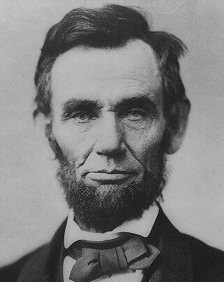
Liam Neeson (not as he appeared at Monday night’s Constant Gardener soiree or at Tuesday’s Asylum party…I didn’t have the brass to take his picture), and a former White House resident known for tallness, eloquence, greatness, etc.
Spielberg has been talking about making a Lincoln movie since `01, when DreamWorks bought rights to a bio being written by Doris Kearns Goodwin. That book will come out in the fall, reportedly under the title “Master Among Men: The Political Genius of Abraham Lincoln.”
Apparently the most recent screenwriter on the Lincoln script has been the British playwright Paul Webb, who has written at least two previous screenplays, Four Knights and Spanish Assassins.
Neeson says the film will be an inspirational thing. “I think his story really speaks to our time,” he said. “About the separation in this country” — I took it he was referring to the red vs. blue culture wars – “and the sacrifices made and the losses of [the Civil War]…160,000 men killed…the losses, my God.”
He believes that Lincoln’s story “shows we can come through this” — an apparent reference to the war against terrorism — “because it shows men at their best and what we could be again.”
I mentioned that Edward R. Murrow, another honorable historical figure, will soon be portrayed in George Clooney’s Good Night, and Good Luck. Neeson said he was interested in seeing this.
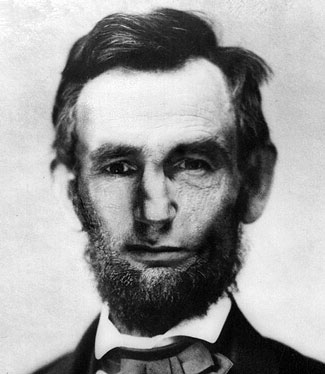
Rendering by Hollywood Elsewhere columnist Michael Felsher (“Cinema Obscura”) of how Liam Neeson will most likely appear in Steven Spielberg’s Abraham Lincoln biopic, which will probably begin shooting in March 2006 and hit screens in ’07.
What part of Lincoln’s life will the Spielberg film cover? “From his inauguration to his assassination,” he said.
How long will it be? “I’m not going to get into that,” he replied.
Has anyone else been cast in any roles? Not that he knew of, Neeson said. (I’ve read a suggestion somewhere that Ben Stiller would make a good John Wilkes Booth. I think Glenn Close would make a good Mary Todd Lincoln.)
Lincoln “spoke very well with his hands,” Neeson said. I recalled a certain hand gesture that Jack Kennedy used to use during speeches — not the famous index-finger jab but an easygoing palms-up gesture, and Neeson said, “Because his palm was up it was non-aggressive and sent an appealing message.”
We eventually talked about Lincoln’s voice, which is where my little sprig of information came into play.
Neeson said that the writings of a contemporary of Lincoln’s named William Herndon said that he had “a clear, higher-pitched voice.” I found similar views during internet research the next day. Lincoln didn’t have a bass or baritone voice, apparently, but a tenor voice. It was described by another witness, Abram Berggen, as “high-keyed.”
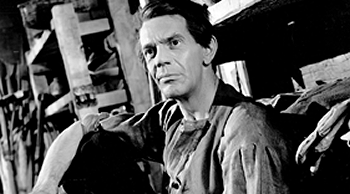
Raymond Massey in Abe Lincoln in Illinois.
Neeson briefly mentioned Raymond Massey’s Lincoln performance in Abe Lincoln in Illinois (1940) and Henry Fonda’s in John Ford’s Young Mr. Lincoln (’39). That led to me to look up Massey’s no-frills biography on Wikipedia. On it I found the following passage:
“Early in Massey’s career, Abraham Lincoln’s son, Robert Todd Lincoln (1843-1926), heard Massey perform and was struck by the close similarity of Massey’s speaking voice to that of his father.”
Neeson was enthusiastic and grateful when I told him about this last night. Massey had a twangy tenor voice mixed with a certain forlorn tone, like he was hoping for something he knew was unattainable.
If I were about to play Lincoln I’d probably want to come up with a voice something like Massey’s, or at least one that doesn’t sound overly “shrill, squeaking, piping [and] unpleasant,” which is how Herndon described Lincoln’s voice as he gave a speech just before assuming the Presidency.
Jarhead
“Just weighing in with my opinion on Sam Mendes’ Jarhead, which screened late last week in Sherman Oaks. I gave it mostly ‘very good’ or ‘excellent’ marks on my feedback card. It’s clearly a smart, haunting, well-acted, handsomely produced modern war film.
“The acting is solid all the way around, especially from Peter Sarsgaard. On my card, I encouraged a strong Oscar push on his behalf.

Jake Gyllenhaaal (r.) eyeballing a noncom who just might be played by Jamie Foxx (l.) in Sam Mendes’ Jarhead.
“As others have noted, many of the musical selections compliment the film nicely (much in the same way Coppola found the right songs for Apocalypse Now). In fact, young Nirvana-lovers like your son may be able to enjoy this film a bit more due to the music.
“You were right on the money when you suggested that this was a Full Metal Jacket for the Gulf War. This is both good and bad. The audience loved the opening scene, despite the fact that it directly rips off R. Lee Ermy’s famous boot camp tirade. (For this, I jotted down a scathing remark to Sam Mendes on my card…not that he’ll ever read it personally.)
“Overall it works very well and needs only to be tightened ever-so-slightly. Let’s all hope it finds a broader audience than David O. Russell’s unjustly ignored Three Kings.” — John McGilicutty
Going Wrong
“All praise to you! That’s right, all of it! You hit the goddamn nail on the head. Bad year for Hollywood? No, no, no…great year for Hollywood.
“So tickets are down. You know why? Movies are down. I haven’t been this happy since The Real Cancun tanked in theatres and my fear of reality movies taking over film as they did television subsided. In professional sports these are called rebuilding years. Hopefully this is a year where the business realizes it doesn’t have a championship-caliber team after all.
“Hopefully after this we will bear witness to studio executives keeping their noses out of the cookie jars and letting the creators do what they do best…fucking create. They might create a piece of shit, but you know what? At least that piece of shit might be more original, instead of a watered-down piece of shit that doesn’t have an identity. That’s what we’ve been getting. I want ambitious failures! Give me Heaven’s Gate!
“Hopefully — I might be hoping a bit too much with this — we might see a new age of creativity come out of this. One that reverts film from the blockbuster template back to the nitty gritty, I’ve-got-an-idea-let’s-shoot-it-no-matter-how-crazy-it-sounds stuff from the 70’s.
“Here’s to a great bad year of cinema!” — Sean Whiteman
Grabs
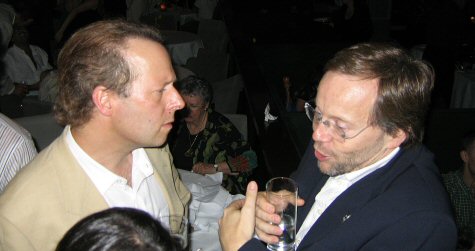
New York Daily News gossip columnist George Rush (i.e., “Rush and Molloy”) speaking with The Constant Gardener director Fernando Meirelles (r.) at post-premiere party thrown by Focus Features at Compass on West 70th Street — Monday, 8.8,10:25 pm.
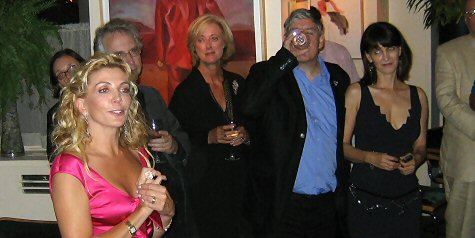
Asylum star Natasha Richardson at tres elegant post-premiere party at Michael’s, 24 East 55th Street on Tuesday, 8.9, 10:40 pm — delivering her thank-you-all-so-very-much, this-is-a-wonderful-moment remarks about her many satisfactions in making the film (a descent-into-madness sexual affair movie set in a British facility for the mentally un-hinged) and especially from the rigors of sinking her teeth into an especially ripe character. Paramount Classics co-prez Ruth Vitale stands to the right in semi-darkness.
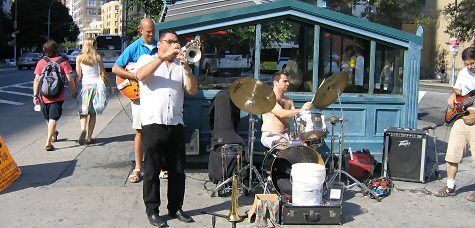
Jazz band letting go across the street from Cooper Union — Saturday, 8.6, 2:15 pm.
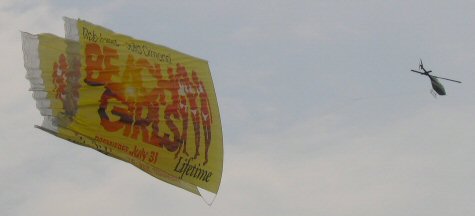
If I hadn’t gone to Rockaway Beach last Sunday and seen this large banner being dutifully pulled across the skies by a helicopter, I would probably never have known about, much less watched, Beach Girls. But I’ve read up on this Lifetime six-hour miniseries and apparently it’s not too bad. Here’s a review by the Baltimore Sun‘s David Zurawik.
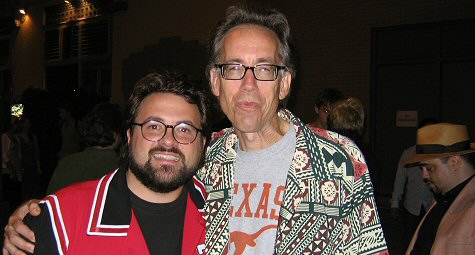
Director-writer Kevin Smith, producer and producer John Pierson at Wellspring party for Reel Paradise, Steve James’ doc about Pierson’s running a theatre in Fiji a couple of years ago. Party followed a premiere screening at Tribeca Cinemas, just south of Houston.
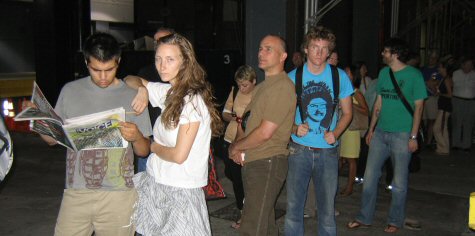
Waiting to see the 10 pm show of Bernardo Bertolucci’s The Conformist at the Film Forum — Saturday, 8.6, 9:40 pm.

Rockaway Beach — 8.7, 2:20 pm.
The Virginian
“I have a few questions/observations about your WIRED piece about the failure of Hollywood’s big-budget, high-concept theme-park movies:
“1. Are these really failures? Of course they’re artistic failures, but it’s my understanding that crap like Stealth still makes money, especially once you factor in the overseas haul. The much-debated domestic box-office slump may be a reflection on how bad these blockbusters have gotten, but unless the international receipts also dry-up, Hollywood will never learn.
“2. Given the importance of the international audience, what are the odds that these films will go away any time soon? You know as well as I do that if it’s loud and dumb, it translates well to the overseas market — you don’t need to subtitle an explosion. Cheap seats are still filled with mouthbreathers whether they’re in Times Square or Thailand.
“3. I sense in your words a lament that these piles of disappointment have constantly pushed out worthier, more artistic films of merit. I disagree, in part. The independent artsy films are still getting made in droves, and while they may not make it to the multiplex in the hinterland, they are making it into homes in both blue and red states via cable and DVD.
“The real casualty here is the intelligent action movie or thriller. These are increasingly difficult to find. Critics such as yourself frequently point to Jaws and Star Wars as the culprit, but such highlighting always fails to recognize that those were actually good films, deserving of their success.
“James Cameron’s Aliens or the two Terminator films or the original Die Hard are reminders that Hollywood has put out compelling, intelligent, and entertaining action films, and a whole lot more recently than the 1970s. Hell, these movies look like absolute classics in comparison to dreck like Stealth, which would have been straight-to-video back in the day (with Michael Dudikoff, most likely).
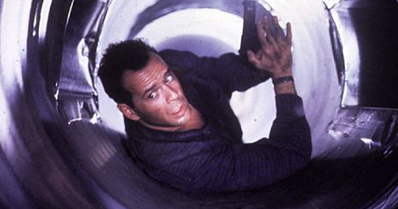
“Yet there are far fewer films of this quality today, and even the ones that come close — like Spielberg’s War of the Worlds — often fall apart upon closer reflection.
“4. Finally, given the problems with getting audiences into theaters, what do you think the solution is? Do you offer them a quiet introspective talky film that plays exactly on DVD at home as it does on the big screen, or do you offer them a big, loud, brash explosion-fueled adventure movie that exploits the THX sound and big screen? There’s a reason why Hollywood relies on this swill: they’re the only things that can get moviegoers to the theater. Geez, this dynamic has been out there for years, I’m surprised I hear so few critics talk about the distinction between movies that are rentals and those that demand to be seen on the big screen.
“Of course, as home theaters improve, more films are going to fall into the rental category regardless of their quality. And as ticket sales fall, Hollywood will inevitably raise ticket prices, killing the golden goose. Meanwhile, the only thing that can possibly save the theater from complete irrelevancy– improving the movie-going experience for people who actually enjoy seeing more than one movie a year on a big movie screen, regardless of subject– that core audience will be ignored.
“Alas, that core audience may paradoxically be the first to abandon theater-going — speaking for me alone, I used to see about sixty movies a year in the theater, but I made less than fifty last year, and in 2005 I’m on pace for less than forty. At these prices and in these conditions (bad lighting, bad sound, bad timing, scratchy prints, inept concessions, annoying patrons), not even a die-hard fan of the big screen like myself is likely to spend money on crap like The Dukes of Hazzard, a film I would have probably seen on a lark as recently as a few years ago.” — Dave, Arlington, Virginia.
More Grabs
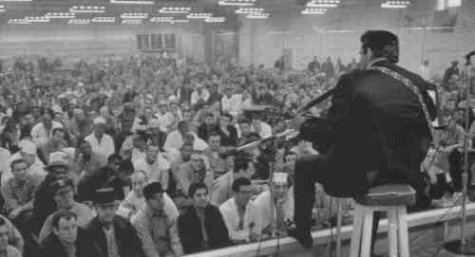
Johnny Cash during the Folsom prison performance he gave back in ’68. I’ve been in and out of a Cash head-space since seeing James Mangold’s Walk the Line last Thursday. I’ve pledged not to say anything about it until Toronto, but I wouldn’t want the lack of even a hint of any enthusiasm about it to say the wrong thing, so let me just say without really saying anything that it tells Cash’s story the right way.

Broadway and… I forget, but roughly two or three blocks north of Houston.

I’m starting to have some serious aesthetic doubts about these slow-exposure blur shots.
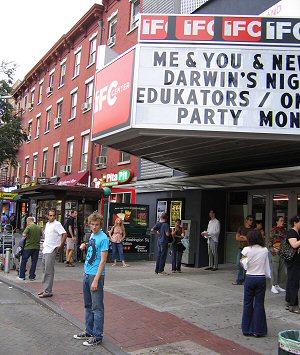
At the IFC Center last Saturday afternoon, around 4:30 pm. The former Waverly Theater is a brand-new indie house with a cool
restaurant featuring the servings of chefs Claudia Fleming and Gerry Hayden.

Is this the only shot of whatsername, the tattle-tale Jude Law nanny? I read somewhere she’s going to spill to the tabloid news shows…terrific.
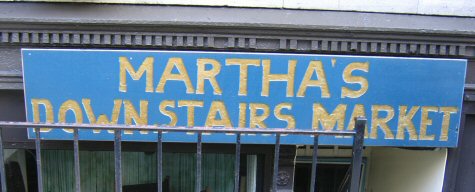
I never even went inside when I took this last Friday or thereabouts, but it’s located on West 15th just east of Eighth Avenue.
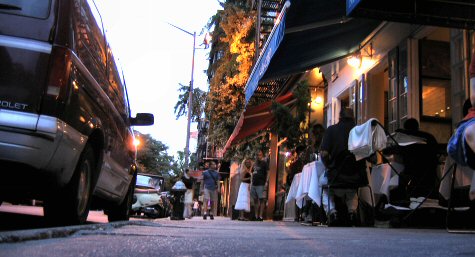
Reactions?
Whenever a one-sheet art serves up a concise iconic image, it’s easy to accept a notion that the film has its shit together.
The poster for Sam Mendes’ Jarhead (Universal, 12.15) shows dog tags with what looks like blood stains at first, but upon closer study is a reflection of the burning oil wells in Kuwait that Iraqi troops ignited at the end of the Iraq war of ’91…very neat.
It’s also clear that the tone and texture is going to be very male and gritty, especially with that slogan. It’s an encouraging take-it-or-leave-it way to start things off.
The contrast with the one-sheet for Rob Reiner’s Rumor Has it (Warner Bros., 12.25) couldn’t be sharper. Reiner’s film is for couples and women and maybe guys, if it’s funny. Jarhead is…well, I’d like to think that women will get into it also.
